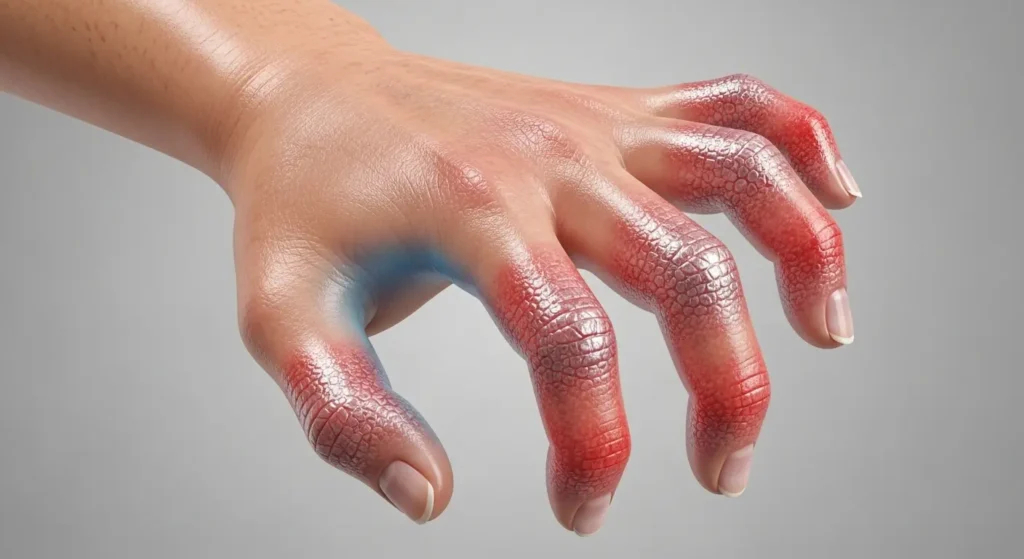Are you asking, “Can psoriatic arthritis cause hair loss?” You’re not alone. Many people with PsA notice unusual shedding and wonder if it’s due to the disease, scalp psoriasis, or medications.
This article explains the connection, highlights what’s temporary versus permanent, and provides solutions for managing and preventing hair loss.
You’ll also learn from expert insights, patient stories, and treatment strategies to protect your hair and restore peace of mind.
How Psoriatic Arthritis and Psoriasis Can Affect Hair Health

What Is Psoriatic Alopecia and How Common Is It?
Psoriatic alopecia refers to hair loss linked to psoriasis or psoriatic arthritis (PsA). While not every patient experiences it, scalp involvement is common, affecting 50–80% of people with psoriasis. Inflammation, scratching, and scaling can weaken follicles, leading to temporary shedding.
In rare cases, scarring alopecia can occur, where chronic inflammation damages hair follicles permanently. However, this is far less common than temporary hair thinning.
Understanding Telogen Effluvium: Stress, Inflammation & Scalp Health
PsA is an inflammatory condition. During flare-ups, systemic inflammation and physical stress can trigger telogen effluvium, a form of diffuse hair shedding where more hairs than usual enter the resting (telogen) phase.
Triggers include:
- Emotional stress from living with PsA
- Nutritional deficiencies (e.g., iron or vitamin D)
- Medications affecting cell turnover
The good news? Telogen effluvium is usually reversible within 3–6 months once triggers are controlled.
Scalp Psoriasis, Scratching, and Damage to Hair Follicles
Scalp psoriasis causes thick plaques, scaling, and itching. Scratching or forcefully removing scales can traumatize follicles, leading to patchy hair loss.
Pro Tip: Keep nails short, use medicated shampoos, and gently soften plaques with prescribed topical solutions before removal to minimize follicle damage.
Do PsA Treatments Contribute to Hair Loss?
Methotrexate, Leflunomide & DMARDs—Weighing Risks vs. Benefits
Certain disease-modifying antirheumatic drugs (DMARDs) prescribed for PsA can cause hair thinning:
- Methotrexate: May trigger hair loss in about 1–3% of users due to effects on folate metabolism.
- Leflunomide: Linked to hair thinning in up to 10% of patients.
- Sulfasalazine & cyclosporine: Rarely associated with hair shedding.
Folic acid supplementation often helps reduce methotrexate-related hair loss. Always consult your doctor before making medication changes.
Will Your Hair Grow Back? Prognosis & Regrowth Timeline
Non-scarring vs. Scarring Alopecia: What the Evidence Shows
- Non-scarring alopecia (most cases): Hair follicles remain intact, and regrowth typically occurs once inflammation or triggers are controlled.
- Scarring alopecia (rare): Chronic, untreated scalp psoriasis can destroy follicles permanently, making early dermatological care critical.
Typical Regrowth Timeline
- Telogen effluvium: 3–6 months after inflammation or stress resolves.
- Psoriatic alopecia: Variable—often improves with effective psoriasis treatment.
- Medication-related loss: May reverse after dosage adjustment or switching drugs.
Practical Treatment & Self-Care Strategies
Medicated Shampoos, Topical Therapies & Phototherapy Options
- Coal tar or salicylic acid shampoos help reduce scaling.
- Topical corticosteroids or vitamin D analogs calm inflammation.
- Light therapy (UVB phototherapy) may improve scalp lesions.
Gentle Hair Care, Scalp Soothing Tips & Stress Management
- Avoid scratching or picking plaques.
- Use lukewarm water, not hot showers.
- Massage scalp with natural oils to soothe irritation.
- Practice stress-reduction techniques (yoga, meditation, or counseling).
Lifestyle Adjustments to Reduce Inflammation & Support Hair
- Maintain a balanced anti-inflammatory diet (rich in omega-3s, antioxidants, and lean protein).
- Correct deficiencies (iron, zinc, vitamin D).
- Quit smoking, limit alcohol, and prioritize restful sleep.

FAQs About PsA-Related Hair Loss
Will my hair regrow if I stop the medication?
Often, yes, especially if the alopecia was drug-induced. However, consult your doctor before stopping any PsA therapy.
How can I tell if hair loss is due to PsA vs. other causes?
A dermatologist can evaluate scalp lesions, lab work (iron, thyroid), and hair pull tests to identify the cause.
Which PsA treatments have the least risk of hair loss?
Biologics generally have a lower hair loss risk compared to methotrexate or leflunomide, but responses vary individually.
When should I see a dermatologist or rheumatologist?
If hair loss is rapid, patchy, or worsening, or if scalp plaques are causing bleeding or scarring.
Can stress reduction really help hair regrow?
Yes—stress can trigger telogen effluvium and worsen psoriasis. Managing stress helps improve both scalp health and hair regrowth.
Next Step
Hair loss with psoriatic arthritis can feel overwhelming, but remember it’s often temporary and manageable with the right care. Early intervention, expert guidance, and gentle self-care can make a significant difference.
👉 Book a consultation with Dr. Rana Irfan in Islamabad today to discuss your psoriatic arthritis, scalp health, and personalized treatment options for preventing and reversing hair loss.
